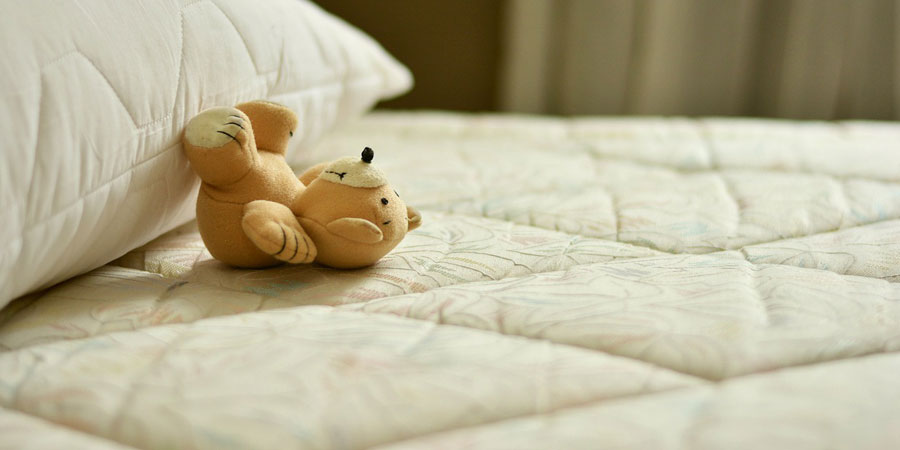Weighted Blankets For The Elderly

As we age sleep patterns may change, and you may find you have difficulty staying asleep. Poor sleep patterns can contribute to many problems and lead to a reduced quality of life.
Research suggests that weighted blankets may benefit the elderly in a variety of ways. Here you will learn about weighted blankets, their benefits and precautions to be aware of.
What are weighted blankets?
A weighted blanket provides a deep constant pressure on the body that mimics touch pressure therapy. The weight of the blanket puts enough pressure on the body to possibly trigger the production of serotonin (the feel good hormone), a bit like getting a cuddle. It can aid relaxation, have a calming effect and help achieve a deeper sleep. This can have benefits for the elderly.
What are the benefits of weighted blankets for the elderly?
There hasn’t been a lot of research done relating to the use and benefits of weighted blankets but there has been a few smaller studies which you can find here.
Weighted blankets may benefit the elderly in the following ways:
- Improve quality of sleep
- Reduce symptoms of stress and anxiety
- Relieve symptoms of depression
- Relieve the perception of pain
- May reduce the need for some medications
- Reduce symptoms related to certain conditions such as dementia and Alzheimer’s, arthritis, and Parkinson’s
Sleep
Weighted blankets stimulate the production of our natural sleep hormone, melatonin, while also lowering the body’s stress hormone, cortisol. This helps us fall into a faster and deep sleep.
Stress and anxiety
Weighted blankets activate the body’s parasympathetic nervous system (the calm response) – breathing and heart rate slow down, allowing the body to enter a deep state of calm. It undoes the work of the sympathetic nervous system (stress response) which produces the feelings of stress and anxiety.
Depression
Weighted blankets stimulate the production of mood-boosting chemicals like serotonin and dopamine, making us feel happy and content and reducing feelings of depression.
Chronic pain
Research around weighted blankets suggests that they may help combat relentless pain by lowering stress, improving sleep quality and reducing perception of pain.
Medications
Weighted blankets don’t interfere with existing medications, providing a low-risk way for the elderly to find relief from certain health conditions.
Health conditions
Dementia
Dementia often causes anxiety and depression which in turn often lead to insomnia. Weighted blankets can improve sleep quality and quantity leaving people feeling more rested the next day. This can help ease feelings of anxiety and agitation through the day.
Parkinsons
For people with Parkinson’s, a weighted blanket can help relieve anxiety, improve sleep, help with body stiffness and pain as well as help keep tremors a bay.
Arthritis
It is common with arthritis for someone to be kept up at night with reduced motion, pain and stiffness. Pain feels worse without enough sleep and so the vicious cycle begins. A weighted blanket can help relieve pain and improve sleep quality.
How to choose a weighted blanket
Weighted blankets come in various weight increments as in the chart below. As a rule, the maximum weight of the blanket should be within 10% of the adult’s body weight. A properly sized weighted blanket should provide the pressure needed for better mental and physical health without being so heavy that removal is difficult.
Source: healthline.com
Precautions with weighted blankets
When choosing a weighted blanket for an elderly person, safety is paramount. Although weighted blankets are generally safe, there is a suffocation risk for older adults that are particularly frail. They should never be pulled over the head and face.
A heavy blanket could make an elderly person feel restricted which could lead to feelings of panic. It could also hinder their movement or increase the risk of falling if they need to get up during the night.
There are also certain conditions a person may have which means they shouldn’t use a weighted blanket. These include some sleep disorders, sleep apnoea, respiratory problems and some medical conditions.
In conclusion
So weighted blankets can have many benefits and with the right precautions, can be very beneficial for the elderly in many ways. They are widely available and come in a range of textures and colours, so why not give one a try!
Eximius are dedicated to the care of the elderly and those with complex medical conditions. Check out the blog for lots more helpful advice.